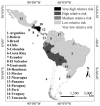An Assessment of the Relationships between Extreme Weather Events, Vulnerability, and the Impacts on Human Wellbeing in Latin America
- PMID: 30134614
- PMCID: PMC6163949
- DOI: 10.3390/ijerph15091802
An Assessment of the Relationships between Extreme Weather Events, Vulnerability, and the Impacts on Human Wellbeing in Latin America
Abstract
Climate change and variability are known to have an influence on human wellbeing in a variety of ways. In Latin America, such forces are especially conspicuous, particularly in respect of extreme climatological, hydrological, and weather events (EWEs) and climate-sensitive disasters (CSDs). Consistent with the need to study further such connections, this paper presents an analysis of some of the vulnerabilities of environmental health issues and climate-related impacts that are focusing on EWEs and CSDs in Latin American countries. The research includes an analysis of the (i) human and socio-economic development; (ii) geographical and socio-economic determinants of vulnerability and adaptability of environmental health issues (exposure, sensitivity, and adaptive capacity); (iii) occurrence of CSDs from 1988 to 2017 and their direct impacts on human wellbeing (Total death and Affected people); (iv) an online survey on the perceptions of the effects of EWEs on human wellbeing in a sample of countries in the region; and (v) discussion of possible solutions. The socio-economic and development indices, and the International Disaster Database (EM-DAT) and Climate-Risk Index (CRI) disaster statistics suggest that the impacts of CSDs are primarily related to socio-economic determinants of human wellbeing and health inequalities. Also, >80% respondents to the survey say that the leading causes of climate-related human impacts are the lack of (i) public awareness; (ii) investment and (iii) preparedness. The paper concludes by adding some suggestions that show how countries in Latin America may better cope with the impacts of Climate-sensitive Disasters.
Keywords: climate change; climate change adaptation; climate disasters; environmental health; geographical determinants; online survey; socioeconomic determinants; sustainable development; vulnerability; wellbeing.
Conflict of interest statement
The authors declare no conflict of interest.
Figures






Similar articles
-
Climate change, extreme weather events, and us health impacts: what can we say?J Occup Environ Med. 2009 Jan;51(1):26-32. doi: 10.1097/JOM.0b013e31817d32da. J Occup Environ Med. 2009. PMID: 19136870 Review.
-
Spatially Representing Vulnerability to Extreme Rain Events Using Midwestern Farmers' Objective and Perceived Attributes of Adaptive Capacity.Risk Anal. 2019 Jan;39(1):17-34. doi: 10.1111/risa.12943. Epub 2017 Nov 29. Risk Anal. 2019. PMID: 29193188
-
The potential impacts of climate variability and change on health impacts of extreme weather events in the United States.Environ Health Perspect. 2001 May;109 Suppl 2(Suppl 2):191-8. doi: 10.1289/ehp.109-1240666. Environ Health Perspect. 2001. PMID: 11359686 Free PMC article. Review.
-
Disaster risk, social vulnerability, and economic development.Disasters. 2017 Apr;41(2):324-351. doi: 10.1111/disa.12199. Epub 2016 May 12. Disasters. 2017. PMID: 27174613
-
A Comparative Analysis of Climate-Risk and Extreme Event-Related Impacts on Well-Being and Health: Policy Implications.Int J Environ Res Public Health. 2018 Feb 13;15(2):331. doi: 10.3390/ijerph15020331. Int J Environ Res Public Health. 2018. PMID: 29438345 Free PMC article. Review.
Cited by
-
Identifying gaps on health impacts, exposures, and vulnerabilities to climate change on human health and wellbeing in South America: a scoping review.Lancet Reg Health Am. 2023 Aug 24;26:100580. doi: 10.1016/j.lana.2023.100580. eCollection 2023 Oct. Lancet Reg Health Am. 2023. PMID: 37876675 Free PMC article.
-
Current and Future Climate Extremes Over Latin America and Caribbean: Assessing Earth System Models from High Resolution Model Intercomparison Project (HighResMIP).Earth Syst Environ. 2023;7(1):99-130. doi: 10.1007/s41748-022-00337-7. Epub 2022 Dec 19. Earth Syst Environ. 2023. PMID: 36569783 Free PMC article.
-
Livelihood Vulnerability of Marine Fishermen to Multi-Stresses under the Vessel Buyback and Fishermen Transfer Programs in China: The Case of Zhoushan City, Zhejiang Province.Int J Environ Res Public Health. 2020 Jan 25;17(3):765. doi: 10.3390/ijerph17030765. Int J Environ Res Public Health. 2020. PMID: 31991750 Free PMC article.
-
An Ecological Approach to Disaster Mitigation: A Literature Review.Cureus. 2023 Sep 18;15(9):e45500. doi: 10.7759/cureus.45500. eCollection 2023 Sep. Cureus. 2023. PMID: 37868429 Free PMC article. Review.
References
-
- Ebi K., Bowen K. Extreme events as sources of health vulnerability: Drought as an example. Weather Clim. Extreme. 2016;11:95–102. doi: 10.1016/j.wace.2015.10.001. - DOI
-
- Field C.B., Barros V., Stocker T.F., Qin D., Dokken D.J., Ebi K.L., Mastrandrea M.D., Mach K.J., Plattner G.K., Allen S.K. IPCC: Managing the Risks of Extreme Events and Disasters to Advance Climate Change Adaptation. Cambridge University Press; Cambridge, UK: New York, NY, USA: 2012. p. 582.
-
- Field C.B., Barros V.R., Dokken D.J., Mach K.J., Mastrandrea M.D., Bilir T.E., Chatterjee M., Ebi K.L., Estrada Y.O., Genova R.C. IPCC: Climate Change 2014: Impacts, Adaptation, and Vulnerability. Cambridge University Press; Cambridge, UK: New York, NY, USA: 2014. p. 1132.
MeSH terms
LinkOut - more resources
Full Text Sources
Other Literature Sources
Medical

